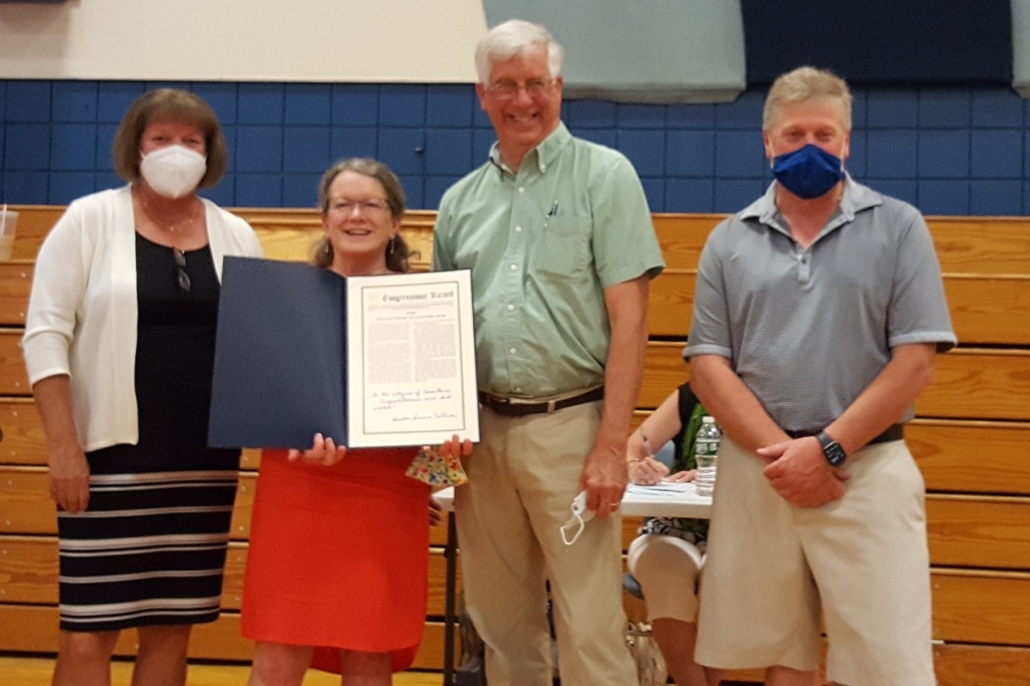
Available on town of China website, under “Elections.”
For the second year in a row, China’s annual town business meeting will be entirely by written ballot, with voters able to choose an absentee ballot or a Tuesday, June 8, trip to the polls.
To shorten voting time, town officials have condensed the ballot into 26 articles, most dealing with 2021-22 appropriations and town policy.
The 2021-22 school budget is not on the local ballot. Regional School Unit #18 voters approved it at a May 20 open meeting, and on June 8 China voters (and voters in Belgrade, Oakland, Rome and Sidney) will affirm or reject it by written ballot.
China polls will be open from 7 a.m. to 8 p.m. Tuesday, June 8, in the portable classroom behind the town office. Absentee ballots may be obtained from the town office by mail, telephone or email through Thursday, June 3. They must be returned before the polls close on June 8.
A copy of the town meeting warrant and multiple related documents are on the town’s website, china.govoffice.com. To read them, click on “Elections” in the left-hand column.
Four of the 26 articles have generated discussion over the last several months.
Art. 8 asks voters to appropriate $16,530 for animal control, $34,000 for police expenses and $40,060 for emergency services dispatching. The $34,000 is intended to pay for 10 hours a week for special Kennebec County Sheriff’s Office patrols in China, replacing the present police department.
Information on the reasoning behind the proposed change is on the website. See also the letters from Police Chief Craig Johnson and former Selectman Robert MacFarland and the article by Town Manager Becky Hapgood in the May 13 issue of The Town Line, p. 11.
Art. 15 requests a $26,471 appropriation for FirstPark, the Oakland business park in which China and other area municipalities invested 20 years ago. Because revenue from the park has lagged behind projections and supporting municipalities have not seen profits, the park has been controversial in recent years.
The park’s bond is now paid off, but according to Hapgood, member municipalities’ obligations do not end until next year. China selectmen are likely to discuss ending the contract in 2022.
Art. 16 asks voters to approve an amended Tax Increment Financing (TIF) program and to appropriate $256,000 from TIF revenue to be spent in the 2021-22 fiscal year for purposes designated in the document.
China’s Tax Increment Financing Committee discussed the changes at great length before submitting them to selectmen, who approved them for forwarding to voters. Major additions allow TIF money to be used for broadband service (with limitations); to assist the China Lake Association and China Region Lakes Alliance with projects that improve lake water quality; and to assist with the Alewife Restoration Initiative (ARI) that brings alewives into China Lake by removing or modifying dams on Outlet Stream in Vassalboro.
The amended TIF document is on the website.
Art. 25 asks voters whether they want to sell about 40 acres of town-owned land on the east side of Lakeview Drive, opposite the Cottages at China Lake (formerly Candlewood). Selectman Janet Preston has consistently opposed selling the property. She presented arguments for keeping it as Adams Memorial Park in a commentary in the May 20 issue of The Town Line, p. 11.
Most of the articles ask voters to approve the 2021-22 municipal budget and policies for town officials. Art. 11, the most expensive article, asks $1,423,692 for the public works department, of which more than $600,000 will be spent repaving town roads.
Art. 4 combines requests for $589,427 for town administration (salaries and related), $214,600 for administration other (supplies, town office utilities and related) and $25,000 for accrued compensation (the fund to pay for unused time off if someone resigns or retires).
Art. 10 requests $623,005 to run the transfer station next year, and permission to use fees paid in the current year for unusually large amounts of demolition debris to offset costs of disposing of that debris.
Requests for $146,605 for assessing costs and $30,000 for legal expenses are combined in Art. 7. Art. 9 asks for $151, 547 for fire and rescue services; it does not include the previously-controversial firefighters’ “stipends,” which are instead in the $107,500 requested in Art. 12 for community support organizations.
The annual request for money to let selectmen cover unforeseen expenditures has been increased from $55,000 to $123,680 (Art. 14). Town Manager Hapgood explained that the increase is intended to cover “unbudgeted changes in employee benefits resulting from life events or new hires” and unemployment claims, if any. The $123,680 comes from surplus and reserve accounts, not from taxes. Unspent money will lapse back into the accounts at the end of the fiscal year.
Requested policies include permission for selectmen to sell tax-acquired properties (Art. 20) and specifically to sell the 1982 John Deere grader (Art. 24); to accept and use grants and gifts (Art. 21); and to make multi-year contracts (Art, 32).
In the event that voters refuse to approve one or more spending articles, Art. 26 provides that officials can continue to spend money for the rejected purpose at the current year’s funding level.
June 8 is business meeting
China’s June 8 meeting is the town business meeting, not the annual town meeting. By state law, the annual town meeting is when voters elect local officials. China’s local elections are held in November – the 2021 election day is Nov. 2.
For many years, China’s elections and voting on the annual budget were held together at the March town meeting. Selectmen noticed that more voters turned out for November written-ballot voting on state and national issues (and an occasional local referendum) than for the in-person spring meeting. To get more voters’ input, they moved the local election, and thus the town meeting, to November.
According to the town website, the following officials’ terms will end in November 2021:
- On the Selectboard (two-year terms): Irene Belanger and Wayne Chadwick.
- On the Planning Board (two-year terms): Randall Downer, in District One; and Natale Tripodi, alternate elected from anywhere in town. The District Three position is currently vacant; if there were an incumbent, his or her term would end in November 2021.
- On the Budget Committee (two-year terms): Robert Batteese, Chairman; Kevin Maroon, District One; and Dana Buswell, District Three.
- Representative on the Regional School Unit 18 Board of Directors (two-year term): Neil Farrington.
CORRECTION: In the description above of the Nov. 2 local elections in the May 27 issue of The Town Line, the length of selectboard terms was incorrectly stated. Selectmen are elected for two-year terms, not for three years. It was a reporting error.
 by Mary Grow
by Mary Grow







